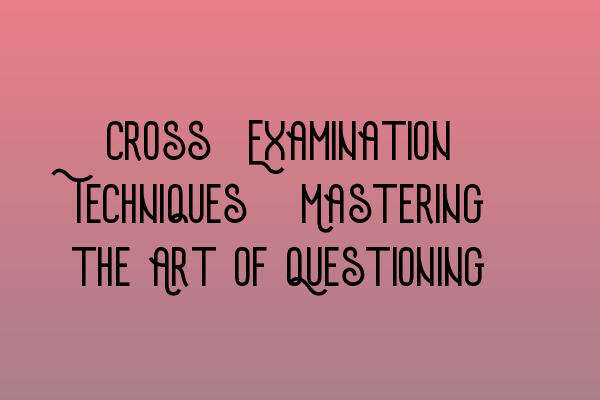Cross-Examination Techniques: Mastering the Art of Questioning
As criminal defense solicitors, one of the most crucial skills we must possess is the ability to conduct effective cross-examinations. The art of questioning witnesses during a trial not only allows us to challenge the prosecution’s evidence but also provides us with an opportunity to present our clients’ side of the story. In this article, we will explore some essential cross-examination techniques that can help us master the art of questioning.
1. Ask Open-ended Questions
When cross-examining a witness, it is crucial to ask open-ended questions that require more than a simple “yes” or “no” answer. By doing so, we can encourage the witness to provide detailed explanations, which often reveal inconsistencies or gaps in their testimony. For example, instead of asking, “Did you see the defendant at the crime scene?” we can ask, “What were you doing at the crime scene when you saw the defendant?” This technique allows us to gather more information and potentially uncover valuable insights that can help our case.
2. Use Leading Questions Strategically
While open-ended questions are useful for extracting information, leading questions can be powerful tools for challenging witnesses and highlighting inconsistencies in their statements. By asking leading questions that suggest the desired answer, we can control the direction of the testimony and expose any contradictions. For instance, asking, “Isn’t it true that you were present at the crime scene on the night of the incident?” can force the witness to either confirm or deny their presence, which can be advantageous for our defense strategy.
3. Establish Credibility Through Impeachment
Another crucial technique in cross-examination is the impeachment of witness credibility. By presenting evidence that contradicts the witness’s testimony or undermines their reliability, we can weaken their credibility in the eyes of the jury. This can be achieved by introducing prior inconsistent statements, highlighting biases or motives, or exposing any previous convictions. Impeaching the witness not only brings their credibility into question but also adds weight to our defense arguments.
4. Maintain Control and Confidence
During cross-examination, it is essential to maintain control of the proceedings and exude confidence. This not only enhances our credibility as solicitors but also puts pressure on the witness, potentially leading them to reveal unintended truths or inconsistencies. By staying composed, focused, and assertive, we can effectively navigate through cross-examination and present our case with conviction.
5. Practice, Practice, Practice
Like any other skill, mastering the art of questioning requires practice. Engaging in mock cross-examinations with colleagues or attending training courses specifically designed for criminal defense solicitors can significantly improve our abilities. By honing our questioning techniques, we become more effective advocates for our clients, increasing the chances of achieving favorable outcomes in court.
As criminal defense solicitors, our expertise lies in navigating the intricate world of criminal law. To further enhance your knowledge and professional development, we recommend exploring related articles such as:
- SQE 1 Practice Exam Questions
- SQE 1 Practice Mocks FLK1 FLK2
- SQE 2 Preparation Courses
- SQE 1 Preparation Courses
- SRA SQE Exam Dates
By delving into these resources, you can expand your knowledge base, stay up-to-date with the latest developments, and further develop your legal skills.
Mastering the art of questioning is essential for criminal defense solicitors looking to provide the most effective representation for their clients. By utilizing open-ended questions, strategically employing leading questions, impeaching witness credibility, maintaining control and confidence, and dedicating time to practice, we can navigate cross-examinations with skill and finesse. By continuously honing our questioning techniques and leveraging available learning resources, we can continuously refine our skills and achieve optimal results for our clients.
